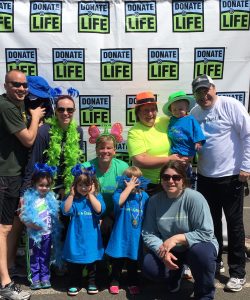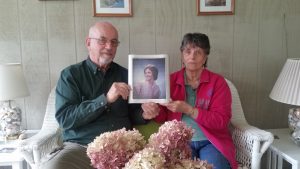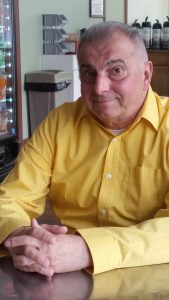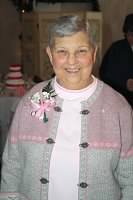WESTFIELD—Over the past six years, the city has raised the flag in front of city hall and the fire department to remember those affected by organ donation.
And this past April, a group of people stood with Mayor Brian Sullivan, representing the impact of organ donation on residents of Westfield. Among those there were fire commission chairman and tissue recipient Albert Masciadrelli, former city advancement officer for Westfield Jeff Daley and resident Margaret Seery. Each represented stories of organ donation, whether they were touched by it or a family member was.
For Masciadrelli, without organ and tissue donation he may have lost one of his passions and his career.
For many years, Masciadrellli worked as a photographer for United Technology, photographing computer circuit boards. He and his co-workers would take the images and place them on glass plates or film for later use.
“It had a lot to do with aircraft in the space program,” he said.
In fact, it had so much to do with the space program that Masciadrelli claimed that his name is on a piece of equipment on the moon. He said that he helped work on a portion of the lunar lander, and when they were packaging it up and getting ready to seal it, he asked to sign his name. Eventually, it was OKed.
“I signed my name on a device that’s still on the moon,” he said proudly.
However, in the 1970s Masciadrelli began to notice that his vision was starting to wane.
“I noticed my vision and eyesight deteriorating while driving,” he said.
He wasn’t sure at first what was wrong, and he decided to visit a local doctor to figure it out.
“I was diagnosed with karataconus, a hereditary eye disease,” he said.
Masciadrelli was connected to an opthalmologist in the Boston area at Massachusetts General Hospital. Through them, he began to receive treatment. However, as the 1970s bore on, Masciadrelli’s vision in one eye continued to deteriorate.
Eventually, it was found that he needed a new cornea and artificial lens. And so, the doctors placed him on the list to receive tissue donation.
“I got the transplant in 1980,” he said. “I was on the list for about two weeks. The initial match was said to be too old for my tissue but they found a second person.”
Masciadrelli said at the time the surgery was a new technique at Massachusetts General Hospital. He was put under anesthesia and couldn’t move his head for several days following the procedure.
However, after the procedure and healing, Masciadrelli had 20-20 vision again.
“I couldn’t find out who the donor was,” he said.
This is common for those who receive organ and tissue donation. However, recipients are provided with the opportunity to thank those who donated, or the families of those who donated after they died, with an anonymous card that is confidential to the family.
Masciadrelli said that after about 30 years, in 2010, he once again noticed something wrong with his eyesight.
He went back to where he had the procedure done, and it was recommended that it be done again. Another donor was found and the procedure was once again done, but this time with much quicker healing.
“I stayed not even eight hours,” he said. “I could do what I want to do.”
And once again, he wasn’t told who the donor was.
However, thanks to the two donors, Masciadrelli—who has since retired from his job as chief photographer for United Technology—can continue to take photographs and see the world.
“If it wasn’t for some individual, I wouldn’t be seeing today,” he said.
Another resident who was impacted by organ donation was Jeff Daley’s mother, Christine Daley.
“Many years ago she was diagnosed with polycystic kidney disease, basically kidney failure,” Jeff Daley said.
According to Jeff, Christine “went on with life” with this ailment for several years, until her kidneys fully failed. Christine had to go on dialysis, which carries a significantly higher mortality rate compared to kidney transplantation. While on dialysis, she was also placed on a waiting list for a kidney transplant.
She waited three and a half years.
Then, one night in Jan. 2001, Jeff Daley said she received the call that helped change her life.
“She got a call and told to ‘get to the hospital as soon as you can, we have an organ’,” Jeff said.
The call came in around 11:30 p.m., and by the next morning she was in surgery receiving a new kidney.
“It was a gift of life,” Jeff said. “She probably would have never seen everything that happened after that.”
According to Jeff, the transplant gave his mother Christine an additional 14 years of life. Without it he said, she would have had a quarter of that. And through those additional years, Jeff said that Christine was able to watch children grow, celebrate major family events and also become an advocate for organ donation.
“She worked with the National Kidney Foundation and the local chapter of Donate Life from Connecticut,” Jeff said. “Whatever it was she would participate.”

Members of “Chris’ Crew participating in a fundraising walk for Donate Life, as per Jeff Daley. From left to right: Charlie Gamache, Watson Gamache (under hat) Lainey Gamache, Kate Gamache, Charlotte Daley, Jody Michalski, Jordyn Daley, Joanne Daley (Christine’s daughter), Jenn Daley, Calen Daley and Jeff Daley (Christine’s son). Photo provided by Jeff Daley
She even started the flag-raising in Westfield for the “Donate Life” banner.
All this would not be possible though, without someone donating their kidney. And unfortunately, Jeff said this came through tragedy. The donation, Jeff said, came from a person who died in an accident.
“It’s definitely an emotional rollercoaster because you’re sad somebody passed away for this but your loved one is going to get a new lease on life,” Jeff said. “My mom really took that to heart, she really wanted to get the word out there.”
And unfortunately, it is often tragedy that leads to new life being given to others through organ donation.
One family that was impacted by this side of organ donation is that of Margaret Seery, and her three grandchildren, Makayla Lusby, 18, Cheyenne Lusby, 12, and Ariel Lusby, 10.
Seery’s daughter, Colleen Lusby, who is also the mother of Seery’s three grandchildren, suffered from asthma for most of her life, Seery said.
“She was an asthmatic and had a lot of close calls, then she seemed to outgrow it,” Seery said. “But several years in it progressed due to stress, because of stressful situations she kept having asthma attacks.”

Margaret Seery (right), holding a photograph of Colleen Lusby with her second husband, Paul Seery (left), in their Westfield home.
The stress continued to build according to Seery, with mounting issues at home. And at one point, Seery said that without her knowledge Colleen was in an induced coma due to an asthma attack.
Two weeks after that, on Sept. 15, 2010, Seery said she spoke to Colleen while Colleen was at work.
“I called her at work and you could tell she was having trouble breathing,” Seery said.
Seery suggested to Colleen that she should seek medical attention. According to Seery, she went home and later collapsed.
Seery said that Colleen was transported to a hospital in New Bedford, Massachusetts, where she lived, and eventually flown to Tufts New England for further treatment.
Seery was told a few days later that she should get to the hospital.
“They tried all sorts of methods but weren’t successful. She was on life support and the following Wednesday, Sept. 22, we talked about taking her off life support,” she said.
Seery knew that her daughter was an organ donor, having signed up as a teenager. Seery and her family discussed whether to allow the use of her organs and tissues and they agreed. Asked if this was a difficult decision, Seery answered quickly.
“No,” she said. “She was a caring, loving, thoughtful person and I knew she wanted us to do this.”
She later added, “We knew she would be living on with someone else, helping someone else.”
According to Seery, several of Colleen’s organs were able to go to others, to help others in situations like Albert Masciadrelli and Christine Daley. Seery said Colleen’s liver and kidneys were used, and her corneas went to a child in Massachusetts.
“She had the prettiest eyes, my daughter, violet blue.”




